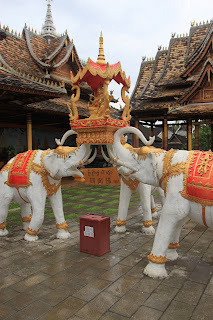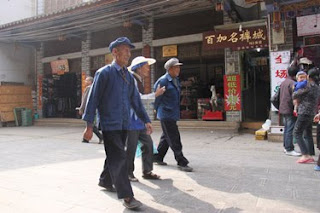

SATURDAY, APRIL 23 - SUNDAY, APRIL 24
The sun was shining in through the bus' massive windows as we rolled along. The ride the night before had been harsh but as I looked out I was welcomed by a pleasant scene: tropical trees and shrubs. Welcome to the jungle, I thought.
Sadly, this part of the trip wasn’t all fun and games. I thought because Jinghong, in the Xishuangbanna region, was located far from Yunnan’s other major tourist spots in the north that it would be more real, more rugged and less touristy. I was wrong, very wrong, on all counts.
The first downer was our visit to a botanical garden near Menglun, two hours east of Jinghong. Lonely Planet and a few online travel sites I consulted beforehand alleged that this was one of the most beautiful in the region and had a wild array of tropical flora and fauna. It wasn't and it didn't. Most of the flowers were dead or dying. Their color and energy was all but lost –like my feelings for Xishuangbanna, which was quickly failing to impress. The only exotic animal I saw was a small lizard. Another animal howled at me from a distance but never revealed itself.
On our way back to Jinghong, we stopped in Menghan to see a Dai minority park. Yunnan is home to 25 of China’s 55 minority groups. The Dai are prominent in Xishuangbanna.
“Park” definitely wasn’t the best word for this place -- it was more like a minority zoo. The only difference was the minority “attractions” here could come and go as they pleased and probably weren’t going to try to eat us.
Zoo similarities aside, a re-enactment of the Dai’s water splashing festival brightened up the overall dreary and depressing atmosphere of minority exploitation.
The faux festival began calmly enough with Dai men and women clothed in a vibrant menagerie of red, blue, green and yellow dresses splashing rose petals dipped in water on everyone’s arm. This was the good luck part. The group then moved into a shallow pool surrounding a large water fountain, picked up small plastic containers and began splashing about. The water spiraled into the air and the faces of anyone within close enough proximity to the festivities.
The next day we visited what was described as a “real rainforest,” an out of the way park not many tourists knew about. Maybe this would be fun.
Wrong again.
The forest preserve was packed with loud, camera-totting Chinese tourists who took just as many pictures of me – a wild and exotic specimen if ever they saw one– as they did of the plants and trees. And since it was located next to a major highway, my fascination with the trees and lagoons was frequently interrupted by the honking of cars and trucks as they whizzed by. On top of that, the weather was a bit on the torrential side, which didn’t bother me that much since I was, after all, in a rainforest. It just slowed my ability to take lots of photos.
Part of the preserve eventually wound off into thicker jungle away from the freeway and mob of tourists. The path followed a small stream and eventually wound its way up a hill that provided a stunning view of the lower canopy of the rainforest and the ravine below.
After two days in Jinghong, I was soaked, over my budget and without a single photo of a wild monkey (I was promised wild monkeys by guidebooks and friends). But I was still glad to have trudged through the rainforest. I'll just go and check that off my list of things to do while in China.

GREEN TREES, GREEN WATER: The water in photos of the main lagoon looked a lot cleaner on websites I looked at while planning the JInghong portion of my trip. The waters in this not quite black lagoon looked murky enough to be hiding a creature or two

SPRING HAS SPRUNG: A lush rainbow array of flowers were the centerpiece of the gardens -- too bad most of them were in pretty bad condition, mostly drooping and looking like they were on the verge of completely losing their color

ME AND THE MEKONG: To get into the botanical garden, we had to cross a long suspension bridge over the Mekong River, called the Lancang in Chinese

TREE OF LIFE: This giant ficus was one of thousands of trees at the botanical garden. It also happened to have a "Danger! Poison!" sign hanging nearby, so I refrained from attempting to climb it

RANDOM TEMPLE: Gold temples like this were scattered about the countryside in Xishuangbanna -- places of worship for Buddhists

DAI HOUSES: The basements of each Dai house were open air, with the living quarters elevated. I'm assuming this is because heavy rains would otherwise flood the lower floors of each house

WATER, WATER EVERYWHERE: In Dai culture, water symbolizes purity or the ability to wash away the past and start anew. Splashing water is a gesture of goodwill toward one’s family, friends, neighbors or anyone who happens to get in the way of a water-filled bowl





HIGH FIVE BUDDHA: Xishuangbanna is a Buddhist-dominant region, although more in line with Southeast Asian buddhism as opposed to Tibetan buddhism

IT'S ELEPHANT TIME: China may be known as the land of the dragons, but Xishuangbanna is elephant country. Elephant statues, elephant carvings and elephant chairs were all over the place -- the only thing I had a hard time finding were actual elephants

BAD MONKEY: This monkey was one of three jungle animals I saw during my two days in Jinghong. As I walked past, he tried to grab my shirt and I was quick to move away, given his bloodshot eyes and weird stare

GO AWAY: A torrential downpour added to the effect of walking through the jungle at a rainforest preserve outside Jinghong. It rained, and rained, and rained some more. A pair of shoes was ruined and my backpack and our Lonely Planet guide got soaked, but the photos were worth it

IN THE JUNGLE: An elephant stands guard over the entrance to the rainforest preserve



MY NEW BFF: For 10 kuai (about $2) I got to feed this strange monkey-squirrel looking thing a piece of banana on a stick

































